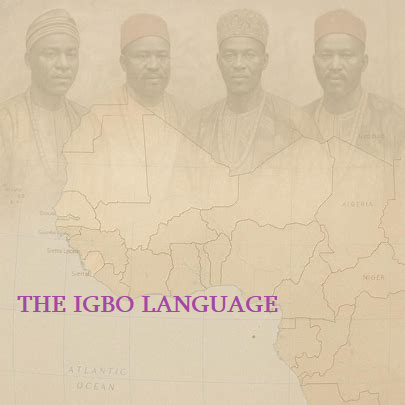Igbo Language
The Igbo language (Asụsụ Igbo) is the principal language of the Igbo people of southeastern Nigeria. It belongs to the Niger-Congo language family, one of the world’s largest language families, and is further classified under the Atlantic–Congo branch, within the Volta–Niger subgroup. Igbo is closely related to other Volta–Niger languages such as Yoruba, Edo, Itsekiri, Idoma, and Nupe. Despite belonging to the same subgroup, mutual intelligibility between Igbo and these languages is minimal due to significant lexical and phonological divergence. Within Igbo itself, however, there are numerous dialects, many of which are only partially mutually intelligible. The modern Standard Igbo is largely based on the Owerri and Umuahia dialects, though it has absorbed influences from others.
Origins and Historical Development
The Igbo language is believed to have developed from the Proto-Volta–Niger language, spoken several thousand years ago in the lower Niger River basin. Oral traditions and linguistic evidence suggest that the Igbo people have been in their present homeland for millennia. Igbo remained an exclusively oral language until the 19th century, when Christian missionaries introduced a written form using the Latin alphabet. The earliest works in Igbo were translations of biblical texts, with the first complete Igbo Bible published in 1913 by the Church Missionary Society. These translations helped standardize orthography and grammar, though tensions between dialects made consensus difficult.
During the colonial and post-colonial period, Igbo gained recognition as one of Nigeria’s major languages, along with Hausa and Yoruba. The Nigerian Civil War (1967–1970), fought largely in Igbo-speaking regions, influenced both the cultural and linguistic identity of the Igbo people, solidifying efforts to preserve and expand Igbo as a literary and educational medium.
Geographic Distribution and Number of Speakers
Igbo is spoken predominantly in southeastern Nigeria, encompassing the states of Abia, Anambra, Ebonyi, Enugu, and Imo, as well as parts of Delta and Rivers states. It is also spoken by diaspora communities throughout Africa, Europe, and the Americas. As of the early 21st century, Igbo has an estimated 27–30 million native speakers, making it one of the most widely spoken languages in Africa. Despite its wide speaker base, Igbo faces pressures from English, which is Nigeria’s official language, especially in education and government.
Literature and Famous Works
Igbo has a rich oral tradition of folklore, proverbs, and songs, which remain central to its cultural identity. Written Igbo literature gained prominence in the 20th century. One of the most famous works is “Ọmenuko” (1933) by Pita Nwana, widely considered the first novel written in Igbo. The book tells the story of a slave trader who rises to power, illustrating Igbo values, struggles, and historical context.
The most internationally recognized Igbo writer is Chinua Achebe, who, though he primarily wrote in English, frequently incorporated Igbo phrases, proverbs, and cultural concepts in his novels such as Things Fall Apart (1958). His integration of Igbo language and worldview into global literature brought Igbo culture international attention. Other notable Igbo-language authors include F. C. Ogbalu, a pioneer in Igbo linguistic research, and Tony Ubesie, known for his novels written entirely in Igbo during the 1970s and 1980s.
Grammar
Igbo is an analytic, tonal language with little inflectional morphology. Grammatical relationships are largely indicated through word order, particles, and context. The typical word order is Subject–Verb–Object (SVO).
-
Example:
-
Nwoke ahụ riri nri.
“The man ate food.”
-
Igbo verbs are not conjugated for tense in the same way as in Indo-European languages. Instead, tense and aspect are indicated by particles placed before or after the verb.
-
Ọ ga-eri nri. – “He/She will eat food.”
-
Ọ na-eri nri. – “He/She is eating food.”
Pronouns in Igbo distinguish person and number, but not gender. For example, ọ can mean “he,” “she,” or “it,” depending on context.
Phonology
Igbo is a tonal language with two primary tones (high and low) and downstep phenomena, meaning pitch is essential to distinguishing word meaning. For example:
-
ákwá – “crying”
-
àkwà – “bed”
-
ákwà – “cloth”
-
àkwá – “egg”
Consonant clusters are relatively rare, and syllable structure is predominantly open (CV). Vowels are divided into two harmonic sets, reflecting an advanced tongue root vowel harmony system. There are eight vowels: /i, ɪ, e, a, o, ɔ, u, ʊ/.
Vocabulary
Igbo vocabulary reflects indigenous concepts of kinship, agriculture, religion, and social structure, while also borrowing words from English, Hausa, and Yoruba due to centuries of contact. For example:
-
Ụlọ – “house”
-
Nne – “mother”
-
Nna – “father”
-
Akwụkwọ – “book” (modern coinage, originally meaning “leaf”)
Proverbs (ilu) are especially valued in Igbo communication. They serve as carriers of wisdom and cultural memory. A common saying is:
-
Ilu bụ ụzọ ịkụziri mmadụ ihe.
“A proverb is a way to teach someone something.”
Conclusion
The Igbo language is not only a vehicle of daily communication but also a repository of cultural values and traditions. Despite pressures from English and internal dialectal differences, it continues to thrive as one of Africa’s major languages, supported by a vibrant oral and written literature. Its tonal system, analytic grammar, and rich vocabulary make it a language of both academic interest and cultural pride.

